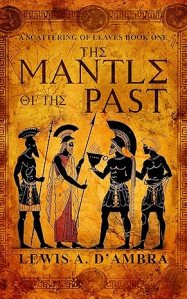Synopsis:
The Mantle of the Past is a Literary Titan Gold Book Award winner and the first book in the A Scattering of Leaves Series. Set in the world of Kolgennon, a place where myth, legend and reality clash.
The King of Kings has fallen. His vast domain teeters on the brink of civil war as his generals squabble over his legacy, conquered peoples plot rebellion and old foes seek to reassert themselves.
The dust has only just begun to settle on the conquests of Tekolger, King of the Doldun, who exploded out of the east to forge an empire not seen since before the ancient cataclysm known as the Dusk. His body has not yet been brought home, his armies have not yet returned from his final campaign, but already plots have begun, factions are forming, and rivalries ancient and new are starting to stir.
All the while old powers thought long passed into memory, or simply fictions of fevered imaginations, are once again troubling the minds of men and showing themselves on the fringes of civilisation.
Will the rise of the Doldun prove to be a false dawn? Or will the conquests of the King usher in a new age of peace and prosperity for Kolgennon.
Favorite Lines:
“Strange how children can make such statements and misunderstand things with such enthusiasm.”
“She allowed herself to drift and be taken in by the sacred waters and time seemed to slip away, like none of the worries and stresses of the world above mattered anymore, a supreme ecstasy washed over her and with it came clarity. Just like a gentle hand, it seemed to take her in its embrace, the water wrapping around her. Sanae began to drift into a serene nothing.”
“Find your blood, find your home and you will know.”
My Opinion:
I received a copy of this book from the author in exchange for my honest opinion.
As the first installment to the A Scattering of Leaves series, The Mantle of the Past takes place in the world of Kolgennon which seems to be inspired by the Mediterranean and Near East regions. The king of kings, Tekolger, has died and those he leaves behind suddenly find themselves locked in a power struggle over who will rule the empire in his wake. The Doldun are on the move to conquer as much of the world as they can while old powers thought to be only myths begin to awaken from their slumber.
This story had echoes of an epic to me and I was trying to recall the last time I read one such as this; all I could come up with was The Odyssey. In this first book of the series, D’Ambra crafts a world where the interplay of war, politics, and divine forces shapes not only the fate of kingdoms but also the very identities of its characters. With a richly detailed setting and a sprawling narrative, the book invites readers to experience a world on the brink of transformation, where every action—whether personal or political—carries monumental weight.
At the heart of the story is the kingdom of Kolgennon, a realm teetering on the edge of both internal and external conflict. What sets this book apart is the depth with which D’Ambra builds his world—its history, cultures, and the subtle ways in which the divine and mortal realms overlap. The author’s extensive background in history, military service, and political experience is evident in the way he approaches the political landscape of Kolgennon. His world feels grounded, believable, and alive with tension, as characters grapple with the changing tides of power, ambition, and legacy. It’s a world that feels as if it could exist just beyond the pages, a product of meticulous world-building and a deep understanding of human nature.
D’Ambra’s ability to weave such a carefully crafted world with multiple, intricate character subplots is what really drove home the sense of this being an epic to me. The novel introduces several key protagonists, each of whom is navigating their own personal struggles amidst the broader political turmoil. D’Ambra doesn’t rush the story—rather, he takes his time to establish the setting, the conflicts, and the characters’ emotional landscapes. For some readers, this might feel like a slower progression, but for those who enjoy layered storytelling and deep world-building, this approach enhances the richness of the narrative.
Summary:
Overall, this was a rewarding read. Touching on themes of loyalty, identity, politics, leadership, and what it means to be human, this book weaves personal struggles with a larger narrative that results in a story that resonates on both a character-driven level and a more epic, world-changing scale. I would recommend this to anyone who enjoys stories with complex world-building, and intricate-driven plots revolving around political intrigue, divine mythologies and warring conflicts. If you enjoy epics, this book is for you. Happy reading!
Check out The Mantle of the Past here!
